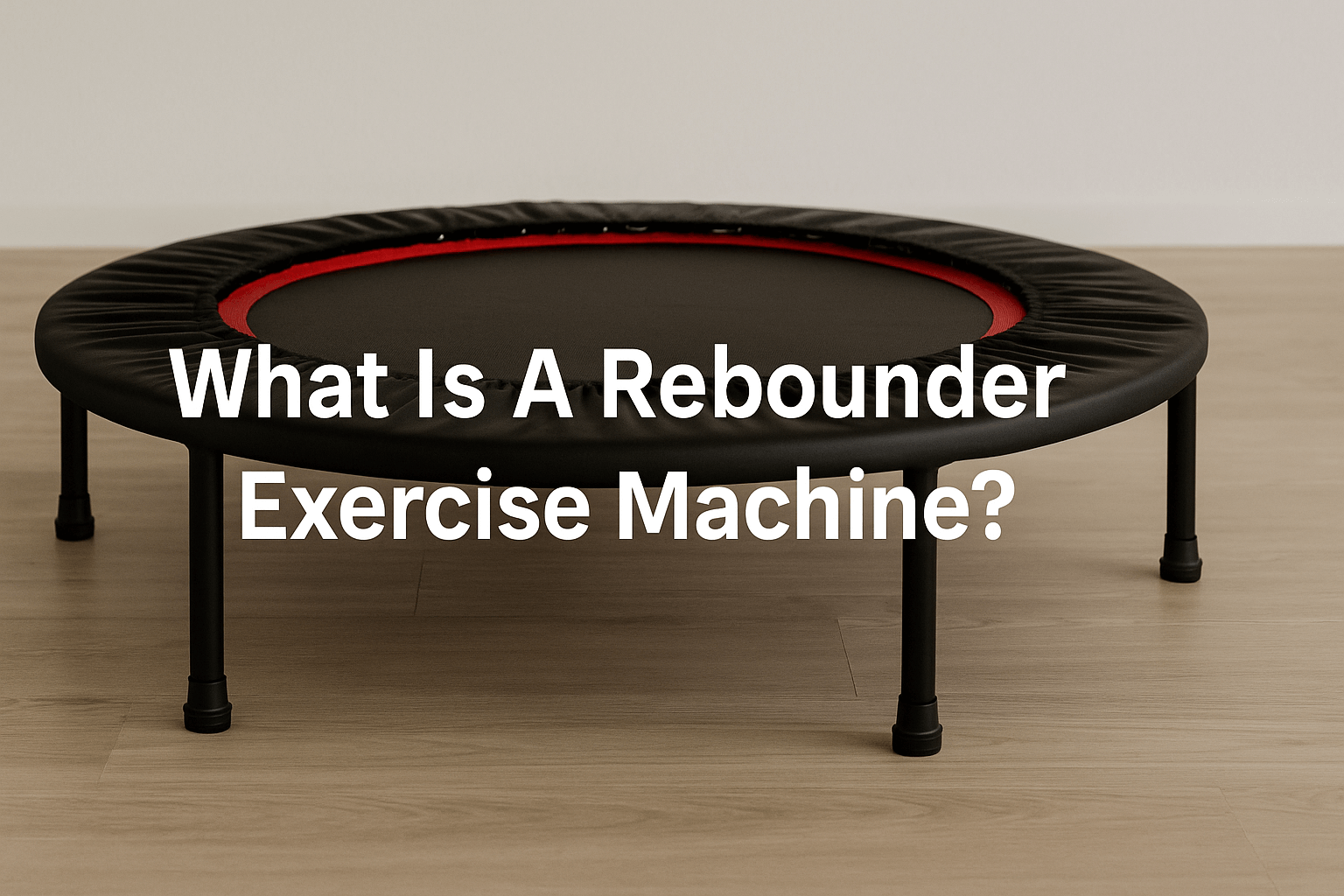
What Is A Rebounder Exercise Machine?
Ever wished exercise felt more like playtime than punishment? A rebounder exercise machine—basically a mini trampoline—lets you bounce (yes, rebounding!) your way to better fitness. It’s fun, joint-friendly, and surprisingly effective.
Think of it as a sneaky way to get your heart pumping while feeling like you’re back in the playground. Stick around and you’ll see why parents, athletes, and even physios rate it so highly.
The Rebounder Explained: What It Is and What It Does
What is a Rebounder Exercise Machine?
A rebounder is a compact trampoline designed purely for exercise. Unlike the giant one in your neighbour’s garden, this is built for workouts, not backflips.
It’s low-impact, gentle on your joints, but still gets your heart rate soaring. Perfect if running leaves your knees grumbling.
What is Rebounding?
Rebounding is simply exercising on a rebounder. That might mean gentle bouncing while watching the telly, or a full-on HIIT session that leaves you dripping with sweat.
It’s versatile—one day it’s light cardio, the next it’s muscle toning.
The Difference Between a Rebounder and a Trampoline
Here’s the quick version: trampolines are for play, rebounders are for fitness.
Trampolines are bigger, bouncier, and more about fun. Rebounders are smaller, sturdier, and give you a controlled bounce that’s designed to strengthen, tone, and condition your body.
The History of the Rebounder
Who Invented the Modern Trampoline?
The roots go back to George Nissen, who built the first modern trampoline in the 1930s after watching circus acrobats bounce off safety nets.
It quickly became a hit with gymnasts, the military, and then families.
The Evolution from Trampoline to Rebounder
Fitness enthusiasts saw the potential of trampolines but needed something smaller, safer, and more focused.
Enter the rebounder. By shrinking it down and making it sturdy enough for daily use, it turned into a compact fitness machine you can keep in your living room.

Should You Use a Rebounder? The Benefits of Rebounding
Why Rebounding is a Low-Impact, High-Benefit Workout
Running on concrete pounds your joints. Rebounding, on the other hand, cushions every step.
That’s why physios often recommend it for people recovering from injuries. You can still torch calories, just without the wear and tear.
Health Benefits of Rebounding
Cardiovascular and Lymphatic System Benefits
That up-and-down bounce pumps blood faster, giving your heart a workout. But it also supports your lymphatic system, which doesn’t have a pump of its own.
Think of it as a natural detox—bouncing helps flush out waste while boosting your immune system.
Does Rebounding Build Muscle?
Yes, and not just your legs. Your core works overtime to keep you stable, and your glutes fire with every jump.
It won’t bulk you up like heavy weights, but it’ll give you tone and strength you’ll notice in daily life.
How Rebounding Can Help with Cellulite and Lipedema
While not a magic fix, rebounding improves circulation and lymphatic drainage, which can help reduce the appearance of cellulite.
For people managing lipedema, gentle rebounding is sometimes used to support treatment because it’s kind to the joints while encouraging lymphatic flow.
Combining Rebounding with Weights
Want to take it up a notch? Add light hand weights while bouncing.
It turns a cardio session into a strength workout, giving you even more bang for your buck.

Your Guide to Choosing and Using a Rebounder
How to Select the Right Rebounder
Springs vs. Bungee Cords
Springs give you a firmer, sportier bounce but can be noisier.
Bungees are smoother, quieter, and gentler on the joints—though usually a bit pricier.
Key Features to Consider (Size, Stability, etc.)
Look for a frame that feels rock-solid, a mat with just the right stretch, and handles if you want extra stability.
If space is tight, folding rebounders are a smart choice.
Rebounder Care and Maintenance
How to Store a Rebounder
Most fold neatly and can slide under a bed or sofa. Others stand upright against a wall.
The key is keeping it dry and away from too much sunlight to avoid wear.
Why is My Rebounder Squeaking?
Usually, it’s down to springs or joints. A quick check and a little lubricant often sort it.
Don’t ignore the noise—left too long, squeaks can turn into breakages.
Where to Find and Buy a Rebounder
Where to Buy a Rebounder
In the UK, you’ll find plenty online through Amazon, Argos, and specialist fitness retailers.
Always check reviews to make sure it’s sturdy and well-rated.
Where are ACON and BCAN Rebounders Made?
ACON rebounders come from Finland, built for durability and performance. BCAN, on the other hand, manufactures in China, offering affordable options for beginners.

Rebounding in a Different Context
How to Be a Better Basketball Rebounder
Of course, “rebounding” means something else in basketball—grabbing the ball after a missed shot.
And funnily enough, the same skills apply: balance, quick reactions, and strong legs. Maybe that rebounder session will give you an edge on the court too.
Final Thoughts
Rebounding is one of those rare workouts that doesn’t feel like a chore. It’s fun, low-impact, and genuinely good for you.
Whether you’re a busy parent trying to squeeze in a workout or someone easing back into exercise, a rebounder could be your best-kept secret.
Disclaimer: This content is for informational use only. It is not medical advice. Always seek guidance from a healthcare professional before starting any new exercise programme.
Have you checked out our other posts?
What’s Rebounding On A Trampoline?



Leave a comment